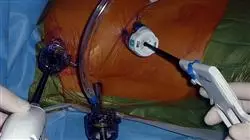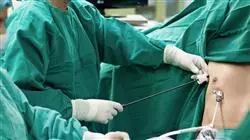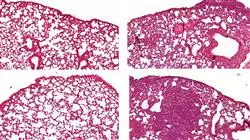University certificate
The world's largest faculty of medicine”
Description
Nowadays, molecular biology is key in the diagnosis and treatment of cancer, and has gone from being a field of research to an essential tool in the management of oncology patients"

Recent studies have reported a reduction in lung cancer mortality among current and former smokers with a minimum of 30 packs/year following the use of low-dose helical computed tomography, and have provided sufficient evidence to establish strong international recommendations for lung cancer prevention. Therefore, a more frequent future presentation of lung cancer will be via a solitary pulmonary nodule, a relevant fact given that diagnosis at advanced stages has been the norm in the last 30 years and the reason for the low prevalence of this disease.
On the other hand, the anti-smoking policies that have been implemented in the last decade are changing the profile of the patient who is usually seen in the office, and although it is not yet very evident, it will become more evident in the coming years.
Therefore, this program contains key and relevant topics for the near future in this field, such as lung cancer screening programs.
Nowadays, talking about oncology means talking about "multidisciplinary teams", about advances in fields of science that are increasingly involved, and this, apart from being interesting, means that we need continuous training that is often difficult to acquire in other training courses or congresses since they are oriented to a very specific area and specific to a single specialty. Not losing this multidisciplinary vision is very important because many advances in one area can have implications in the diagnostic and therapeutic algorithms used in oncology. In fact, one of the skills that we aim for the students to achieve with this program is to have a broad and clear vision of oncology, and to use the comparison of scientific advances in each area as a tool that will allow them to advance in their knowledge.
Expand your knowledge through the postgraduate diploma in Screening, Molecular Biology and Staging of Thoracic Cancer, in a practical way and adapted to your needs”
This postgraduate diploma in Screening, Molecular Biology and Staging of Thoracic Cancer contains the most complete and up-to-date scientific program on the market. The most important features include:
- Clinical practical cases presented by experts in the different specialties
- The graphic, schematic, and practical contents with which they are created provide scientific and practical information on the disciplines that are essential for professional practice
- New developments in Screening, Molecular Biology and Staging of Thoracic Cancer
- An algorithm-based interactive learning system for decision-making in the clinical situations presented throughout the course
- With special emphasis on evidence-based medicine and research methodologies in Screening, Molecular Biology and Staging of Thoracic Cancer
- All of this will be complemented by theoretical lessons, questions to the expert, debate forums on controversial topics, and individual reflection assignments
- Content that is accessible from any fixed or portable device with an internet connection
This postgraduate diploma is the best investment you can make when selecting a refresher program, for two reasons: in addition to updating your knowledge in Screening, Molecular Biology and Staging of Thoracic Cancer, you will obtain a qualification endorsed by TECH Global University”
Its teaching staff includes health professionals belonging to the field of thoracic oncology, who contribute their work experience to this program, in addition to renowned specialists belonging to leading scientific societies.
Thanks to its multimedia content developed with the latest educational technology, they will allow the professionals a situated and contextual learning, that is to say, a simulated environment that will provide an immersive learning programmed to train in real situations.
This program is designed around Problem-Based Learning, whereby the physician must try to solve the different professional practice situations that arise during the course. For this reason, they will be assisted by an innovative, interactive video system created by renowned and experienced experts in the field of thoracic oncology who have extensive teaching experience.
Increase your decision-making confidence by updating your knowledge with this postgraduate diploma in Screening, Molecular Biology and Staging of Thoracic Cancer"

Don't miss the opportunity to update your knowledge in Screening, Molecular Biology and Staging of Thoracic Cancer to improve patient care"
Objectives
The main objective of the program is the development of theoretical and practical learning, so that the physician can master in a practical and rigorous way the study of Screening, Molecular Biology and Staging of Thoracic Cancer.

This refresher program will generate a sense of confidence when practicing medicine and will help you grow both personally and professionally”
General Objective
- To create a global and up-to-date vision of thoracic oncology and all its aspects, allowing the student to acquire useful knowledge and, at the same time, to generate interest in expanding the information and discovering its application in daily practice
Specific Objectives
Module 1. Etiology, Prevention and Screening
- Analyze the effectiveness of different tests proposed for lung cancer screening: low-resolution helical computed tomography, chest radiography and sputum cytology in the early diagnosis of lung cancer
- Define the potential of other screening tests and estimate the population susceptible to be screened for lung cancer
- Update knowledge in the molecular biology of cancer, especially in relation to the concept of genetic heterogeneity, circulating biomarkers and tissue molecular markers
Module 2. Translational Oncology
- Provide and expand knowledge on immunotherapy, as an example of a clear scientific advance in translational research, and one of the most promising lines of research in cancer treatment
- Create a global and updated vision of the exposed topics that will allow the student to acquire useful knowledge and at the same time, generate interest in expanding the information and discovering its application in their daily practice
- Define the potential of other screening tests and estimate the population susceptible to be screened for lung cancer
Module 3. Diagnosis and Staging
- Review the performance and usefulness of each of the tests used in the diagnosis of thoracic tumors
- Describe the usefulness and performance of PET/CT with F18-FDG in the diagnosis, staging, treatment control and monitoring of thoracic tumors
- Learn more about thoracic MRI since it provides very complete anatomical information that can be fundamental for the patient's treatment, in addition to a functional assessment, and on many occasions its tissue characterization
- Review of available diagnostic tests for the assessment of cardiopulmonary reserve, necessary for the identification of patients at high risk of developing perioperative complications and significant long-term functional limitation after resection surgery
- Review the changes proposed for the new edition of the TNM, which imply a more accurate tumor staging

Make the most of this opportunity and take the step to get up to date on the latest developments in Screening, Molecular Biology and Staging of Thoracic Cancer"
-







